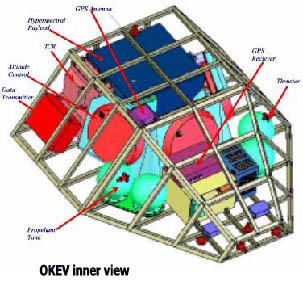Augmentation of an Imaging Constellation with the Hyperspectral Microsatellite OKEV
- O. Mizrachi, D. Linn, T. Bochen, I. Sheli, M. Sandler, S. Irlin, I. Sason, R. Golshmid
- Dr. Fred Ortenberg

The object of this project is to design a micro-satellite using hyperspectral wide field imaging for exploring marine and coastal environments. It is proposed that OKEV be placed in orbit as part of the existing AM-Train formation, in a circular sun synchronous Earth repeating orbit. The OKEV satellite design guidelines included trade studies to iterate spacecraft designs and components and selecting COTS equipment whenever possible while utilizing advanced technologies. The OKEV satellite is an aluminum structure composed of prism and pyramid parts and is stabilized about all three axes using an integrated momentum based system with some acquisition modes. The satellite employs cold-gas reaction thrusters for maneuvers and has redundant on-board computers for command and data handling. Thermal control is provided by a combination of passive methods. Communications (mission and telemetry) with ground station use an innovative S-bands link. Electrical power, provided by body-mounted solar cells and batteries, exceeds 63 W averages including more than a 15% margin. The OKEV design accommodates a mean mission duration of 5 years. The OKEV payload is a remote sensor of the Earth and the Earths atmosphere operated in the hyperspectral mode – WFIS (Wide Field Imaging Spectrometer). The total mass of the satellite is less than 85 kg including 20 kg of WFIS mass.
Links:
http://www.lid-anacostia.net/remote_sensing.htm
http://www.geo.arc.nasa.gov/sge/landsat/17.html
http://eosdatainfo.gsfc.nasa.gov/eosdata/terra/misr/misr.html









